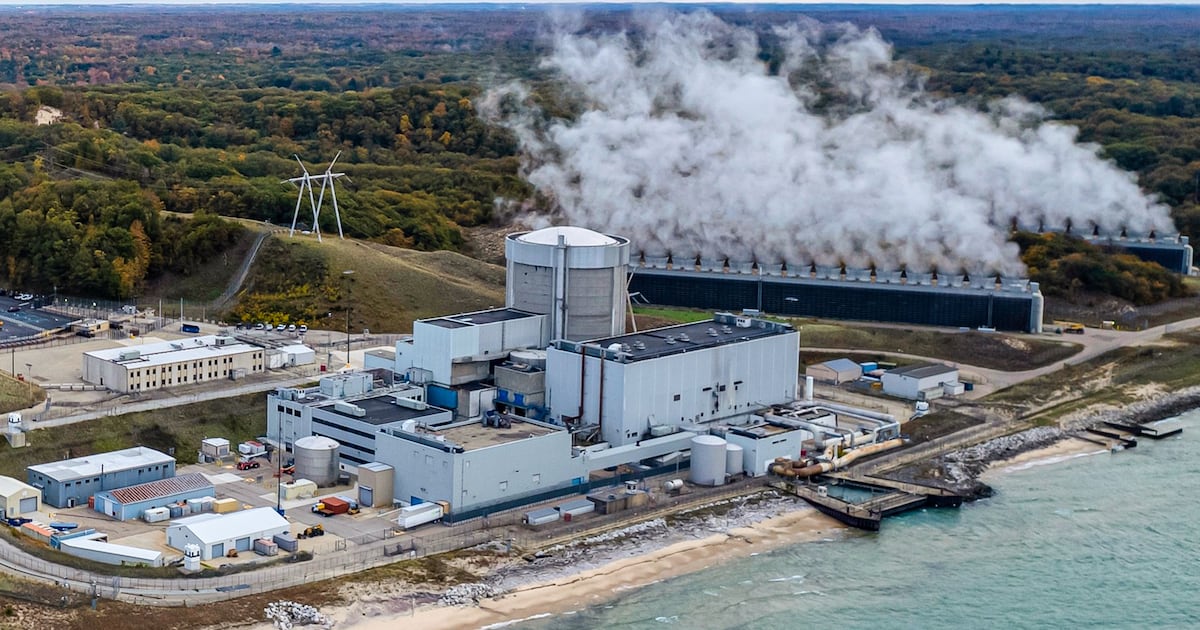Increased energy demands from data centres largely caused by an artificial intelligence boom have given new life to one of the oldest decommissioned US nuclear reactors: Palisades in Covert on Lake Michigan.
The project to bring the Palisades nuclear plant back online after being decommissioned in 2022 has the support of Democratic Michigan Governor Gretchen Whitmer, who has insisted that it is necessary to meet a spike in energy demand along with the state’s goals of reducing fossil fuel emissions.
A recent announcement from the US Nuclear Regulatory Commission (NRC) also bodes well for the decommissioned reactor, now owned by Holtec International.
The NRC gave Holtec the green light to transition Palisades from its current status as decommissioned, to eventually being classified as operationally licensed.
Yet even by nuclear energy standards, the Palisades plant was dogged by criticism in the decade before it was decommissioned.
An NRC report warned about the work culture at Palisades, where safety concerns were often ignored.
In 2016, security workers at the reactor were placed on leave from the plant, then owned by Entergy, for failing to properly follow fire prevention protocols.
But AI-driven energy demands, Michigan’s push for a smaller carbon footprint and Holtec purchasing the decommissioned plant led to a push in taking the reactor back online.
Holtec has received ample funding from the state and federal government to make it all possible.
Beyond Nuclear, a Maryland based non-profit nuclear plant safety watchdog, has referred to Palisades as a “zombie reactor”, given the unprecedented request that it be put back online.
Kevin Kamps, an expert in radioactive waste at Beyond Nuclear, told The National that Holtec has never operated a nuclear reactor.
“It is not intelligent, nor wise, to restart the 60-year-old reactor at Palisades,” he said.
“It was designed in the mid-1960s, built in 1967, and it was a lemon from the get-go.” This was a reference to a lawsuit from Consumers Power, which accused the construction company that built Palisades of flawed design and construction.
Mr Kamps, who lives in West Michigan where Palisades is located, also said that recent developments with more energy-efficient AI offerings, such as DeepSeek in China, nullify the argument that nuclear energy deserves a renaissance to meet a growing energy need.
“Renewables, combined with storage and efficiency, could power AI data centres,” he said.
“Restarting Palisades is an unnecessary risk from both cost and time perspectives, but also an unnecessary risk to health, safety, security and the environment.”
He also pointed out that Arnold Gundersen, a former nuclear engineer-turned-vocal critic of the industry, has cautioned that given its age, Palisades might be susceptible to something called neutron embrittlement, making it more of a safety risk.
Beyond Nuclear has also accused Holtec of trying to push for “plaster fixes” of various tubes within the plant by using a process called “sleeving”, instead of replacing tubes and other equipment.
Nick Culp, a senior manager for government affairs and communications with Holtec Palisades, dismissed Beyond Nuclear’s concerns.
“The plant remains on track and on budget for a safe restart, supported by extensive inspections, testing, preventive maintenance, repairs, and upgrades,” he told The National, also pointing to Palisades’s operational evaluation just before it shutting down in 2022.
“Palisades operated in the NRC’s highest safety category and completed multiple record-setting production runs, which is a testament to the plant’s strong material condition and the professionalism of the team.”
As to the allegations of sleeving for repairs, Mr Culp said that Holtec was using an “industry-proven repair method” in line with its preventive maintenance strategy.
“Each sleeved tube is subject to thorough testing and inspection before return to service,” he said.
Despite the controversy surrounding Palisades, Mr Culp said that Palisades is still on track for what he described as a “safe restart”.
If all goes according to plan and if the NRC continues to grant approval amid regulatory requirements, Palisades could be restarted by the end of this year.
Holtec indicated that means less of a burden on the energy grid, along with thousands of jobs contributing to the West Michigan economy.
It would be premature, however, for Holtec to take a victory lap on Palisades.
Beyond Nuclear has filed a challenge to Holtec through the NRC, which Mr Kamps said revolves around the company’s “request to repair, not replace, the degraded steam generators” inside Palisades.
He also said Beyond Nuclear also wants to litigate the matter in federal court.
“This could happen sooner rather than later,” he told The National.
Meanwhile, the spike in electricity consumption due to the proliferation of AI has led energy providers to warn of a looming energy crunch.
How Michigan chooses to deal with that crunch, along with regulators making decisions about nuclear reactors, could prove to be pivotal for many parts of the US.
The NRC has not yet responded to The National’s requests for comment.
